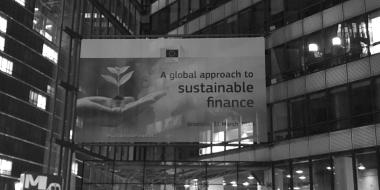Like the window of opportunity to break the Tragedy of the Horizon, Lesley McKenna keeps her observations from yesterday’s conference short.

At yesterday’s (March 21) conference on a global approach to sustainable finance, Vice-President, Valdis Dombrovskis, set the scene by announcing that according to the OECD, the world needs about €6.2 trillion of investment by 2030 to limit global warming to 2 degrees. View the full speech.
To rise to this challenge, the consensus of the room was that scaling sustainable finance was the solution and to achieve the targets of the Paris Agreement we need to join forces, build bridges and accelerate the deployment of private sector capital towards sustainable projects.
Given the conference was dedicated to elevating global cooperation these conclusions are commendable and the fact the sustainable investment has moved from a niche subject to a “transformational force” demonstrates the exceptional strides that have been made to make environmental, social and governance (ESG) factors mainstream.
However, it was the following two speakers at the end of the day that stood out most for me and signalled the direction the market is heading:
1. Mark Carney, Governor, Bank of England
Most of you will be familiar with Mark Carney’s now infamous quote that “climate change is the Tragedy of the Horizon.” In his own words, yesterday’s speech in Brussels saw him shift from lament to positivity. He spoke of the national policies and elements coming into place to smooth the transition to a 2-degree world and the pursuit of a “path to a new horizon” through three critical steps; reporting, risk analysis and return. He further acknowledged how the momentum behind the implementation of the Task Force on Climate- related Financial Disclosures (TCFD) recommendations is creating a “virtuous circle.”
So let’s for a moment celebrate the progress that has made so far and take stock of the fact that over 600 organisations with a total market capitalisation of US$9 trillion have pledged their support for the TCFD recommendations since 2017.
While hope is on the horizon, there is still a lot of work to do and we are only getting started.
As Mark Carney summarised “the task is large, the window of opportunity is short, and the stakes are existential.”
And with this in mind, let’s seize the opportunity to accelerate the adoption of the 11 recommended disclosures worldwide at the scale and pace required to drive long-term impact. View the full speech.
2. Olivier Guersent, Director-General, European Commission
Throughout the conference we heard repeated warning calls to broaden the scope further than climate and recognise that natural capital such as biodiversity loss and resource scarcity also present a financial risk and need to be considered holistically. As Olivier Guersent so succinctly put it in his closing remarks “we need to look beyond climate and make a significant contribution to all SDGs.”
Here at CDSB our mission is to advance the global mainstream corporate reporting model to equate natural capital with financial capital. We look forward to collaborating with companies and investors on what is set to be the market’s greatest challenge yet.